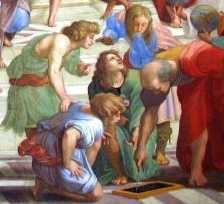Here is the source of the beautiful hymn Of The Father's Love Begotten. I have no idea where they get the "evermore and evermore" which they stick in at the end of each verse, because it doesn't seem to be in the Latin.
I notice that most modern versions use the great J.M. Neale's translation of this hymn as the basis for Of The Father's Love Begotten. Neale seems to have left out the second verse "Corporis formam caduci" which is about Christ redeeming Adam's descendants from sin and death by taking on the form of a body with "limbs liable to death." Too bad, it was my favorite verse to translate. I hope I did it justice!
Corde natus ex Paréntis
Begotten from the heart of the Father
ante mundi exórdium,
before the beginning of the world,
Alpha et Omega vocátus,
Alpha and Omega named
ipse fons et cláusula
He Himself the source and conclusion
ómnium quæ sunt, fuérunt
of all things which exist, have existed
quæque post futúra sunt.
and whatever will exist afterwards.
Córporis formam cadúci,
In the form of fallen man's body,
membra morti obnóxia
with limbs liable to death
índuit, ne gens períret
He clothed Himself, lest His people perish
primoplásti ex gérmine,
which from the first-made's [Adam's] sprout did spring
mérserat quam lex profúndo
those whom the law of sin and death had drowned
noxiális tártaro.
held captive by deepest hell.
O beátus ortus ille,
O how blessed that birth
Virgo cum puérpera
when the Virgin delivered a child
édidit nostram salútem
she brought forth our salvation
feta Sancto Spíritu,
made fruitful by the Holy Spirit
et puer redémptor orbis
and the Child the Redeemer of the earth
os sacrátum prótulit.
presented His Holy face.
Ecce, quem vates vetústis
Behold, Him whom ancient sages
concinébant sæculis,
did chant about in olden times,
quem prophetárum fidéles
the One whom the faithful pages
páginæ spopónderant,
of the prophets had promised,
émicat promíssus olim:
He appears! the One promised once long ago:
cuncta colláudent eum!
Let all things praise Him!
Glóriam Patri melódis
Songs of the Father's glory
personémus vócibus;
let us ring out with our voices;
glóriam Christo canámus,
Let us sing as well the glory of Christ
matre nato vírgine,
born of the Virgin Mother,
inclitóque sempitérnam
and also renowned forever
glóriam Paráclito. Amen.
let us sing the glory of the Paraclete.
Prudentius, d.405.
